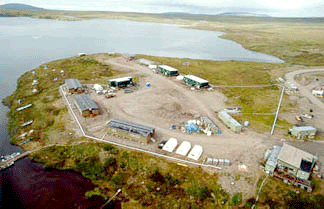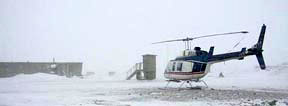|
|||||||||||||
|
|||||||||||||
|
The Arctic Research Support and Logistics (RSL) Program supports the field component of research projects funded through science programs in the Division of Arctic Sciences of OPP and through other programs at NSF. The RSL program also supports proposals that have benefits for the arctic research community. Examples of current awards are for the Arctic Logistics Contractor, VECO Polar Resources; base support of the Arctic Research Consortium of the United States; Toolik Field Station; the Barrow Arctic Science Consortium; procurement and maintenance of instrumentation on the USCGC Healy; and the development of a digital elevation model of the Kuparuk Watershed in northern Alaska. Investigators should outline and justify field support in the context of their proposed work. We recommend briefly outlining the field plan and associated costs within the proposal and in the budget justification. Though costs should not be itemized in the budget spreadsheet, the primary means of accessing logistics support is by describing logistics needs in the proposal. Investigators are particularly encouraged to take advantage of the following support, which can be provided by logistics contractors funded by the Research Support and Logistics program:
If a third party is providing support, e.g., VECO Polar Resources or BASC (see below), those costs do not need to be included in the proposal budget, although the description of the required support should be included. The manager from the program supporting the research, in consultation with the manager of the RSL program, will determine the level of support that can be provided by RSL. In some cases, OPP may determine that several unrelated proposals can derive significant cost benefits from a centrally managed resource, e.g., helicopter support from a central location. If so, NSF's Arctic Support Contractor (VECO Polar Resources) or another entity will be responsible for coordinating the support with the principal investigators, consistent with the agreements between the investigators and their program managers. Work can also be proposed as a large coordinated activity, supported by the science team or a support contractor.
Investigators are encouraged to discuss their projects with the arctic contractors—VECO Polar Resources, BASC, or others (see below)—to get information on support options. VECO Polar Resources provides proposal preparation assistance for work anywhere in the Arctic. The scope of field work should be outlined in the proposal so NSF and logistics providers can plan for support needs.
Third Party Logistics Providers
The RSL program welcomes feedback on the performance of Arctic Logistics providers, and general input about Arctic Logistics in support of research. Work in Greenland There are special requirements for fieldwork in Greenland. Investigators considering work in Greenland should obtain the Danish Polar Center application form. A copy of the form should be included with the proposal submitted to OPP. To obtain a copy of this form electronically, visit the Danish Polar Center website at http://www.dpc.dk. Please note that a new executive order on access to and conditions for travelling in certain parts of Greenland entered into force on 1 January 2007. Information on this change is available on the Danish Polar Center website at http://www.dpc.dk/sw444.asp. Logistics Contacts ALIAS - The Arctic Logistics and Information System web site is evolving into a single point for information about all field sites for research in the Arctic at http://www.arcus.org/alias. Arctic Research Consortium of the U.S. (ARCUS) - A searchable directory of arctic researchers, calendar of arctic meetings and events, the ArcticInfo listserv, downloadable publications, arctic science education opportunities and more can be found on ARCUS' web site at http://www.arcus.org. Barrow Arctic Science Consortium - Contact BASC for logistics support and community and local educational contacts in or near North Slope villages. BASC maintains facilities in Barrow and Atqasuk and supports facilities in the villages of Provideniya and Lavrentiya, in the Chukotka Autonomous Okrug, Russia. http://www.arcticscience.org Danish Polar Center - In concert with VECO Polar Resources, the Danish Polar Center will assist with planning field research in Greenland. More information is on their web site at http://www.dpc.dk. Toolik Field Station - Make your reservation and plan your field season in close contact with the managers of TFS. The necessary forms and contacts are available on the TFS web site at http://www.uaf.edu/toolik. University-National Oceanographic Laboratory System (UNOLS) - Scheduling and development of oceanographic vessels for 64 universities and research laboratories is coordinated by UNOLS on the web at http://www.unols.org. U.S. Coast Guard (USCG) icebreakers - Complete a UNOLS ship request form on the UNOLS web site at http://www.unols.org/ to use this and other arctic research vessels. VECO Polar Resources - OPP's logistics contractor for the Arctic region. Contact VPR for all regions of the Arctic, all support needs, from proposal preparation through the field season. http://www.vecopolar.com/ Other Information Resources: Alaska Native Knowledge Network (ANKN)
|
||||||||||||||||||||||||||||||||||
| Web Policies and Important Links | | | Privacy | | | FOIA | | | Help | | | Contact NSF | | | Contact Webmaster | | | SiteMap |
|
Office of Polar Programs (OPP) The National Science Foundation, 4201 Wilson Boulevard, Arlington, Virginia 22230, USA Tel: (703) 292-5111 , FIRS: (800) 877-8339 | TDD: (800) 281-8749 |
|
|
Last Updated: Jul 10, 2008 |
|||






